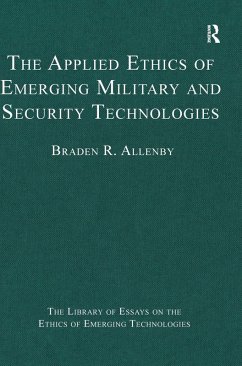Braden R. Allenby
The Applied Ethics of Emerging Military and Security Technologies
Braden R. Allenby
The Applied Ethics of Emerging Military and Security Technologies
- Gebundenes Buch
- Merkliste
- Auf die Merkliste
- Bewerten Bewerten
- Teilen
- Produkt teilen
- Produkterinnerung
- Produkterinnerung
The complex ethical issues which arise from accelerating technological change in the military and security domains are the focus of this collection. The essays take account of the context of rapidly shifting geopolitical and strategic frameworks as well as the spread of many technologies from military and security arenas to civil society, with consequences for core values such as privacy, security, criminal behaviour and state police power. Specific technologies and issues are highlighted, ranging from autonomous robotic systems and unmanned aerial vehicles to cybersecurity, cyberconflict and biotechnology.…mehr
Andere Kunden interessierten sich auch für
![The Warrior, Military Ethics and Contemporary Warfare The Warrior, Military Ethics and Contemporary Warfare]() Pauline M. KaurinThe Warrior, Military Ethics and Contemporary Warfare185,99 €
Pauline M. KaurinThe Warrior, Military Ethics and Contemporary Warfare185,99 €![Research Anthology on Military and Defense Applications, Utilization, Education, and Ethics Research Anthology on Military and Defense Applications, Utilization, Education, and Ethics]() Research Anthology on Military and Defense Applications, Utilization, Education, and Ethics296,99 €
Research Anthology on Military and Defense Applications, Utilization, Education, and Ethics296,99 €![An Introduction to Military Ethics An Introduction to Military Ethics]() Bill RhodesAn Introduction to Military Ethics69,99 €
Bill RhodesAn Introduction to Military Ethics69,99 €![The Military Covenant The Military Covenant]() Sarah InghamThe Military Covenant70,99 €
Sarah InghamThe Military Covenant70,99 €![The Military Covenant The Military Covenant]() Sarah InghamThe Military Covenant190,99 €
Sarah InghamThe Military Covenant190,99 €![Emerging Military Technologies Emerging Military Technologies]() Wilson WongEmerging Military Technologies59,99 €
Wilson WongEmerging Military Technologies59,99 €![Engineering, Business & Professional Ethics Engineering, Business & Professional Ethics]() Simon RobinsonEngineering, Business & Professional Ethics178,99 €
Simon RobinsonEngineering, Business & Professional Ethics178,99 €-
-
-
The complex ethical issues which arise from accelerating technological change in the military and security domains are the focus of this collection. The essays take account of the context of rapidly shifting geopolitical and strategic frameworks as well as the spread of many technologies from military and security arenas to civil society, with consequences for core values such as privacy, security, criminal behaviour and state police power. Specific technologies and issues are highlighted, ranging from autonomous robotic systems and unmanned aerial vehicles to cybersecurity, cyberconflict and biotechnology.
Produktdetails
- Produktdetails
- Verlag: Routledge
- Seitenzahl: 532
- Erscheinungstermin: 28. April 2015
- Englisch
- Abmessung: 250mm x 175mm x 33mm
- Gewicht: 1087g
- ISBN-13: 9781472430038
- ISBN-10: 1472430034
- Artikelnr.: 44637414
- Herstellerkennzeichnung
- Libri GmbH
- Europaallee 1
- 36244 Bad Hersfeld
- gpsr@libri.de
- Verlag: Routledge
- Seitenzahl: 532
- Erscheinungstermin: 28. April 2015
- Englisch
- Abmessung: 250mm x 175mm x 33mm
- Gewicht: 1087g
- ISBN-13: 9781472430038
- ISBN-10: 1472430034
- Artikelnr.: 44637414
- Herstellerkennzeichnung
- Libri GmbH
- Europaallee 1
- 36244 Bad Hersfeld
- gpsr@libri.de
Braden R. Allenby is Lincoln Professor of Engineering and Ethics, and President's Professor of Civil, Environmental and Sustainable Engineering, and of Law, at Arizona State University, USA. He is the founding director of the Center for Earth Systems Engineering and Management, and the founding chair of the Consortium for Emerging Technologies, Military Operations, and National Security, at Arizona State University, USA.
Contents: Introduction. Part I Changing Context and Overview: The implications of emerging technologies for Just War theory
Brad Allenby; The ethics of killer applications: why is it so hard to talk about morality when it comes to new military technology?
P.W. Singer; Summary
National Research Council and National Academy of Engineering; Unrestricted warfare
Qiao Liang and Wang Xiangsui; International humanitarian law and the challenges of contemporary armed conflicts
International Committee of the Red Cross; Technology as dialectic: understanding game changing technology
Noetic Corporation; New capabilities in warfare: an overview of contemporary technological developments and the associated legal and engineering issues in Article 36 weapons reviews
Alan Backstrom and Ian Henderson. Part II Robots and Autonomous Systems: International governance of autonomous military robots
Gary E. Marchant
Braden Allenby
Ronald Arkin
Edward T. Barrett
Jason Borenstein
Lyn M. Gaudet
Orde Kittrie
Patrick Lin
George R. Lucas
Richard O'Meara and Jared Silberman; Terminating the terminator: what to do about autonomous weapons
Wendell Wallach; On banning autonomous weapon systems: human rights
automation
and the dehumanization of lethal decision-making
Peter Asaro; Losing humanity: the case against killer robots
Human Rights Watch; The case for ethical autonomy in unmanned systems
Ronald C. Arkin. Part III Unmanned Aerial Vehicles and the Transition from Military to Civilian Systems: Pandora's box? Drone strikes under jus ad bellum
jus in bello
and international human rights law
Stuart Casey-Maslen; Moral predators: the duty to employ uninhabited aerial vehicles
Bradley Jay Strawser; Lawfulness of a lethal operation directed against a US citizen who is a senior operational leader of Al-Qa'ida or an associated force
US Department of Justice; What the drone debate is really about: it's not privacy or state power
Daniel Rothenberg; The golden age of privacy is over: but don't blame drones
Brad Allenby. Part IV Cyberconflict and Cybersecurity: Computing ethics War 2.0: cyberweapons and ethics
Patrick Lin
Fritz Allhoff and Neil Rowe; Cyber conflict and international humanitarian law
Herbert Lin; Jus in silico: moral restrictions on the use of cyberwarfare
George R. Lucas Jr.; The ethics of cyberwarfare
Randall R. Dipert; 'Cyberation' and Just War doctrine: a response to Randall Dipert
James Cook. Part V Genomics and Neuroscience Engineering: Enhanced warfighters: a policy framework
Maxwell J. Mehlman
Patrick Lin and Keith Abney; National security neuroscience and the reverse dual-use dilemma
Gary Marchant and Lyn Gully; A multidisciplinary approach to an ethic of biodefense and bioterrorism
Victoria Sutton. Name index.
Brad Allenby; The ethics of killer applications: why is it so hard to talk about morality when it comes to new military technology?
P.W. Singer; Summary
National Research Council and National Academy of Engineering; Unrestricted warfare
Qiao Liang and Wang Xiangsui; International humanitarian law and the challenges of contemporary armed conflicts
International Committee of the Red Cross; Technology as dialectic: understanding game changing technology
Noetic Corporation; New capabilities in warfare: an overview of contemporary technological developments and the associated legal and engineering issues in Article 36 weapons reviews
Alan Backstrom and Ian Henderson. Part II Robots and Autonomous Systems: International governance of autonomous military robots
Gary E. Marchant
Braden Allenby
Ronald Arkin
Edward T. Barrett
Jason Borenstein
Lyn M. Gaudet
Orde Kittrie
Patrick Lin
George R. Lucas
Richard O'Meara and Jared Silberman; Terminating the terminator: what to do about autonomous weapons
Wendell Wallach; On banning autonomous weapon systems: human rights
automation
and the dehumanization of lethal decision-making
Peter Asaro; Losing humanity: the case against killer robots
Human Rights Watch; The case for ethical autonomy in unmanned systems
Ronald C. Arkin. Part III Unmanned Aerial Vehicles and the Transition from Military to Civilian Systems: Pandora's box? Drone strikes under jus ad bellum
jus in bello
and international human rights law
Stuart Casey-Maslen; Moral predators: the duty to employ uninhabited aerial vehicles
Bradley Jay Strawser; Lawfulness of a lethal operation directed against a US citizen who is a senior operational leader of Al-Qa'ida or an associated force
US Department of Justice; What the drone debate is really about: it's not privacy or state power
Daniel Rothenberg; The golden age of privacy is over: but don't blame drones
Brad Allenby. Part IV Cyberconflict and Cybersecurity: Computing ethics War 2.0: cyberweapons and ethics
Patrick Lin
Fritz Allhoff and Neil Rowe; Cyber conflict and international humanitarian law
Herbert Lin; Jus in silico: moral restrictions on the use of cyberwarfare
George R. Lucas Jr.; The ethics of cyberwarfare
Randall R. Dipert; 'Cyberation' and Just War doctrine: a response to Randall Dipert
James Cook. Part V Genomics and Neuroscience Engineering: Enhanced warfighters: a policy framework
Maxwell J. Mehlman
Patrick Lin and Keith Abney; National security neuroscience and the reverse dual-use dilemma
Gary Marchant and Lyn Gully; A multidisciplinary approach to an ethic of biodefense and bioterrorism
Victoria Sutton. Name index.
Contents: Introduction. Part I Changing Context and Overview: The implications of emerging technologies for Just War theory
Brad Allenby; The ethics of killer applications: why is it so hard to talk about morality when it comes to new military technology?
P.W. Singer; Summary
National Research Council and National Academy of Engineering; Unrestricted warfare
Qiao Liang and Wang Xiangsui; International humanitarian law and the challenges of contemporary armed conflicts
International Committee of the Red Cross; Technology as dialectic: understanding game changing technology
Noetic Corporation; New capabilities in warfare: an overview of contemporary technological developments and the associated legal and engineering issues in Article 36 weapons reviews
Alan Backstrom and Ian Henderson. Part II Robots and Autonomous Systems: International governance of autonomous military robots
Gary E. Marchant
Braden Allenby
Ronald Arkin
Edward T. Barrett
Jason Borenstein
Lyn M. Gaudet
Orde Kittrie
Patrick Lin
George R. Lucas
Richard O'Meara and Jared Silberman; Terminating the terminator: what to do about autonomous weapons
Wendell Wallach; On banning autonomous weapon systems: human rights
automation
and the dehumanization of lethal decision-making
Peter Asaro; Losing humanity: the case against killer robots
Human Rights Watch; The case for ethical autonomy in unmanned systems
Ronald C. Arkin. Part III Unmanned Aerial Vehicles and the Transition from Military to Civilian Systems: Pandora's box? Drone strikes under jus ad bellum
jus in bello
and international human rights law
Stuart Casey-Maslen; Moral predators: the duty to employ uninhabited aerial vehicles
Bradley Jay Strawser; Lawfulness of a lethal operation directed against a US citizen who is a senior operational leader of Al-Qa'ida or an associated force
US Department of Justice; What the drone debate is really about: it's not privacy or state power
Daniel Rothenberg; The golden age of privacy is over: but don't blame drones
Brad Allenby. Part IV Cyberconflict and Cybersecurity: Computing ethics War 2.0: cyberweapons and ethics
Patrick Lin
Fritz Allhoff and Neil Rowe; Cyber conflict and international humanitarian law
Herbert Lin; Jus in silico: moral restrictions on the use of cyberwarfare
George R. Lucas Jr.; The ethics of cyberwarfare
Randall R. Dipert; 'Cyberation' and Just War doctrine: a response to Randall Dipert
James Cook. Part V Genomics and Neuroscience Engineering: Enhanced warfighters: a policy framework
Maxwell J. Mehlman
Patrick Lin and Keith Abney; National security neuroscience and the reverse dual-use dilemma
Gary Marchant and Lyn Gully; A multidisciplinary approach to an ethic of biodefense and bioterrorism
Victoria Sutton. Name index.
Brad Allenby; The ethics of killer applications: why is it so hard to talk about morality when it comes to new military technology?
P.W. Singer; Summary
National Research Council and National Academy of Engineering; Unrestricted warfare
Qiao Liang and Wang Xiangsui; International humanitarian law and the challenges of contemporary armed conflicts
International Committee of the Red Cross; Technology as dialectic: understanding game changing technology
Noetic Corporation; New capabilities in warfare: an overview of contemporary technological developments and the associated legal and engineering issues in Article 36 weapons reviews
Alan Backstrom and Ian Henderson. Part II Robots and Autonomous Systems: International governance of autonomous military robots
Gary E. Marchant
Braden Allenby
Ronald Arkin
Edward T. Barrett
Jason Borenstein
Lyn M. Gaudet
Orde Kittrie
Patrick Lin
George R. Lucas
Richard O'Meara and Jared Silberman; Terminating the terminator: what to do about autonomous weapons
Wendell Wallach; On banning autonomous weapon systems: human rights
automation
and the dehumanization of lethal decision-making
Peter Asaro; Losing humanity: the case against killer robots
Human Rights Watch; The case for ethical autonomy in unmanned systems
Ronald C. Arkin. Part III Unmanned Aerial Vehicles and the Transition from Military to Civilian Systems: Pandora's box? Drone strikes under jus ad bellum
jus in bello
and international human rights law
Stuart Casey-Maslen; Moral predators: the duty to employ uninhabited aerial vehicles
Bradley Jay Strawser; Lawfulness of a lethal operation directed against a US citizen who is a senior operational leader of Al-Qa'ida or an associated force
US Department of Justice; What the drone debate is really about: it's not privacy or state power
Daniel Rothenberg; The golden age of privacy is over: but don't blame drones
Brad Allenby. Part IV Cyberconflict and Cybersecurity: Computing ethics War 2.0: cyberweapons and ethics
Patrick Lin
Fritz Allhoff and Neil Rowe; Cyber conflict and international humanitarian law
Herbert Lin; Jus in silico: moral restrictions on the use of cyberwarfare
George R. Lucas Jr.; The ethics of cyberwarfare
Randall R. Dipert; 'Cyberation' and Just War doctrine: a response to Randall Dipert
James Cook. Part V Genomics and Neuroscience Engineering: Enhanced warfighters: a policy framework
Maxwell J. Mehlman
Patrick Lin and Keith Abney; National security neuroscience and the reverse dual-use dilemma
Gary Marchant and Lyn Gully; A multidisciplinary approach to an ethic of biodefense and bioterrorism
Victoria Sutton. Name index.








